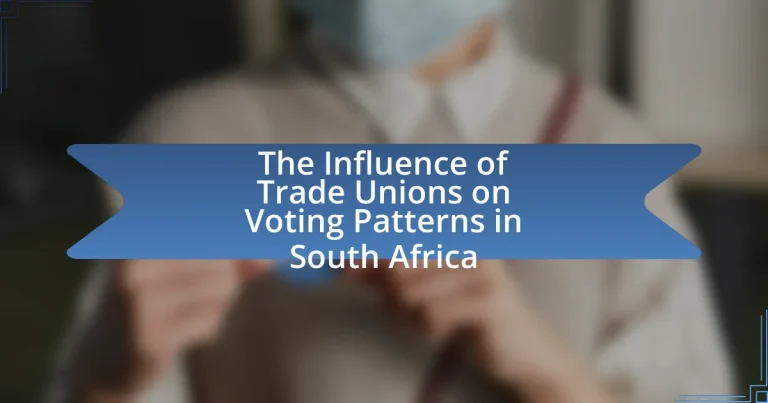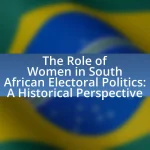Trade unions, particularly the Congress of South African Trade Unions (COSATU), play a significant role in shaping voting patterns in South Africa by mobilizing their members and influencing political discourse. They advocate for workers’ rights and social justice, which often leads to increased voter turnout among union members during elections. The article examines how trade unions engage in political education, organize campaigns, and endorse specific parties, notably the African National Congress (ANC), thereby impacting electoral outcomes. It also explores the historical context of trade unions in South Africa, their evolution in the political landscape, and the challenges they face in maintaining influence amidst changing political dynamics.
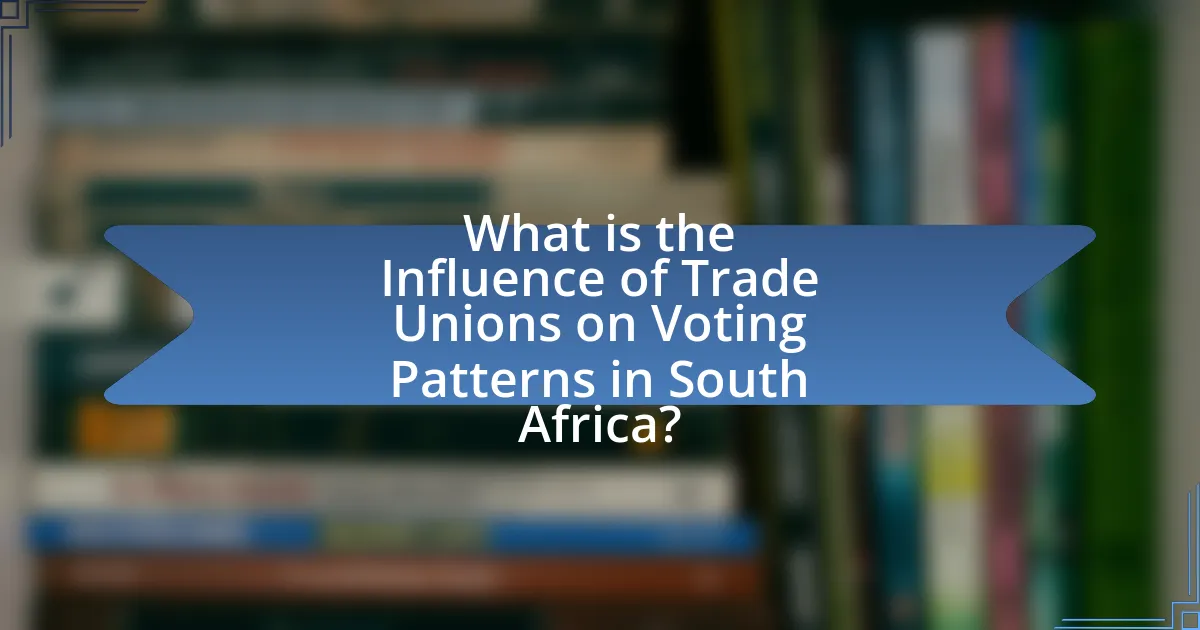
What is the Influence of Trade Unions on Voting Patterns in South Africa?
Trade unions significantly influence voting patterns in South Africa by mobilizing their members and shaping political discourse. They advocate for workers’ rights and social justice, which aligns with the interests of their members, often leading to increased voter turnout among union members during elections. For instance, the Congress of South African Trade Unions (COSATU) has historically endorsed the African National Congress (ANC), impacting the voting behavior of its members and contributing to the ANC’s electoral success. Research indicates that union members are more likely to vote for parties that support labor-friendly policies, demonstrating the unions’ role in guiding political preferences and enhancing civic engagement among workers.
How do trade unions shape political behavior among voters?
Trade unions shape political behavior among voters by mobilizing their members and influencing their political preferences through collective action and advocacy. In South Africa, trade unions play a significant role in shaping voting patterns by organizing campaigns, providing political education, and endorsing specific candidates or parties that align with workers’ interests. For instance, the Congress of South African Trade Unions (COSATU) has historically endorsed the African National Congress (ANC), which has influenced its members’ voting decisions. Research indicates that union members are more likely to vote for candidates who support labor rights and social justice, reflecting the unions’ ability to align political agendas with the interests of their constituents.
What role do trade unions play in mobilizing voters?
Trade unions play a crucial role in mobilizing voters by organizing and advocating for workers’ rights, which influences electoral outcomes. They engage their members through campaigns that highlight key issues such as labor rights, economic policies, and social justice, thereby increasing voter turnout among their constituencies. For instance, during the 2019 South African elections, trade unions like the Congress of South African Trade Unions (COSATU) actively encouraged participation by conducting voter education programs and rallies, which significantly impacted voter engagement. This mobilization is evidenced by the high turnout rates among union members compared to the general population, demonstrating the effectiveness of trade unions in shaping voting behavior.
How do trade unions influence voter education and awareness?
Trade unions influence voter education and awareness by actively engaging their members in political processes and providing resources for informed voting. They conduct workshops, distribute educational materials, and facilitate discussions on political issues that affect workers’ rights and social justice. For instance, the Congress of South African Trade Unions (COSATU) has been known to mobilize its members through campaigns that emphasize the importance of voting and understanding electoral policies. This engagement not only raises awareness about candidates and their platforms but also encourages collective action among workers, thereby enhancing overall voter participation.
What historical context is important for understanding this influence?
The historical context important for understanding the influence of trade unions on voting patterns in South Africa includes the apartheid era, which lasted from 1948 to the early 1990s. During this period, systemic racial discrimination and oppression marginalized the majority black population, leading to the formation of trade unions as a means of collective bargaining and political mobilization. The establishment of the Congress of South African Trade Unions (COSATU) in 1982 played a pivotal role in uniting various labor movements against apartheid, advocating for workers’ rights and social justice. This activism significantly influenced the political landscape, culminating in the first democratic elections in 1994, where trade unions helped to mobilize voters and shape electoral outcomes. The historical struggle against apartheid and the subsequent push for labor rights are crucial for understanding how trade unions have impacted voting patterns in South Africa.
How have trade unions evolved in South Africa’s political landscape?
Trade unions in South Africa have evolved significantly since the end of apartheid, transitioning from primarily labor-focused organizations to influential political entities. Initially, trade unions were largely concerned with workers’ rights and conditions, but post-1994, they began to play a crucial role in shaping national policies and political discourse, particularly through their affiliation with the African National Congress (ANC). This relationship allowed unions to influence legislation, such as the Labour Relations Act of 1995, which established a framework for collective bargaining and workers’ rights.
Furthermore, trade unions have actively participated in electoral politics, mobilizing their members to vote and advocating for policies that align with workers’ interests. The Congress of South African Trade Unions (COSATU), for instance, has been a significant player in the political landscape, often swaying public opinion and voting patterns in favor of the ANC during elections. This evolution reflects a broader trend where trade unions have become integral to the political fabric of South Africa, impacting governance and policy-making processes.
What significant events have impacted trade union influence on voting?
Significant events that have impacted trade union influence on voting in South Africa include the end of apartheid in 1994, the establishment of the African National Congress (ANC) as the ruling party, and the formation of the Congress of South African Trade Unions (COSATU) in 1982. The end of apartheid allowed trade unions to mobilize workers politically, significantly increasing their influence on voting patterns. The ANC’s rise to power, supported by trade unions, solidified their role in shaping labor policies and political agendas. Additionally, COSATU’s formation provided a unified platform for workers, enhancing their collective bargaining power and political engagement, which directly influenced electoral outcomes.
What are the key trade unions involved in South African politics?
The key trade unions involved in South African politics are the Congress of South African Trade Unions (COSATU), the National Union of Metalworkers of South Africa (NUMSA), and the South African Democratic Teachers Union (SADTU). COSATU, established in 1982, is the largest trade union federation in South Africa and plays a significant role in political mobilization and policy advocacy. NUMSA, representing metalworkers, is known for its strong stance on workers’ rights and has been influential in shaping labor policies. SADTU, as a major union for educators, impacts educational policies and reforms. These unions collectively influence voting patterns and political decisions in South Africa through their organizational strength and member mobilization.
Which trade unions have the most significant political affiliations?
The trade unions with the most significant political affiliations in South Africa are the Congress of South African Trade Unions (COSATU) and the National Union of Metalworkers of South Africa (NUMSA). COSATU is affiliated with the African National Congress (ANC), which has historically influenced voting patterns in the country. NUMSA, while initially aligned with COSATU, has taken a more independent stance and has been critical of the ANC, advocating for a leftist political agenda. These unions play a crucial role in mobilizing workers and shaping political discourse, thereby impacting electoral outcomes.
How do these unions interact with political parties?
Trade unions in South Africa interact with political parties primarily through political alliances and lobbying efforts. These unions often align themselves with specific political parties, such as the African National Congress (ANC), to influence policy decisions that affect workers’ rights and labor laws. For instance, the Congress of South African Trade Unions (COSATU) has historically supported the ANC, providing it with organizational support and mobilizing members during elections, which enhances the party’s voter base. This relationship allows unions to advocate for labor-friendly policies, as seen in the implementation of the Labour Relations Act of 1995, which was influenced by union demands.
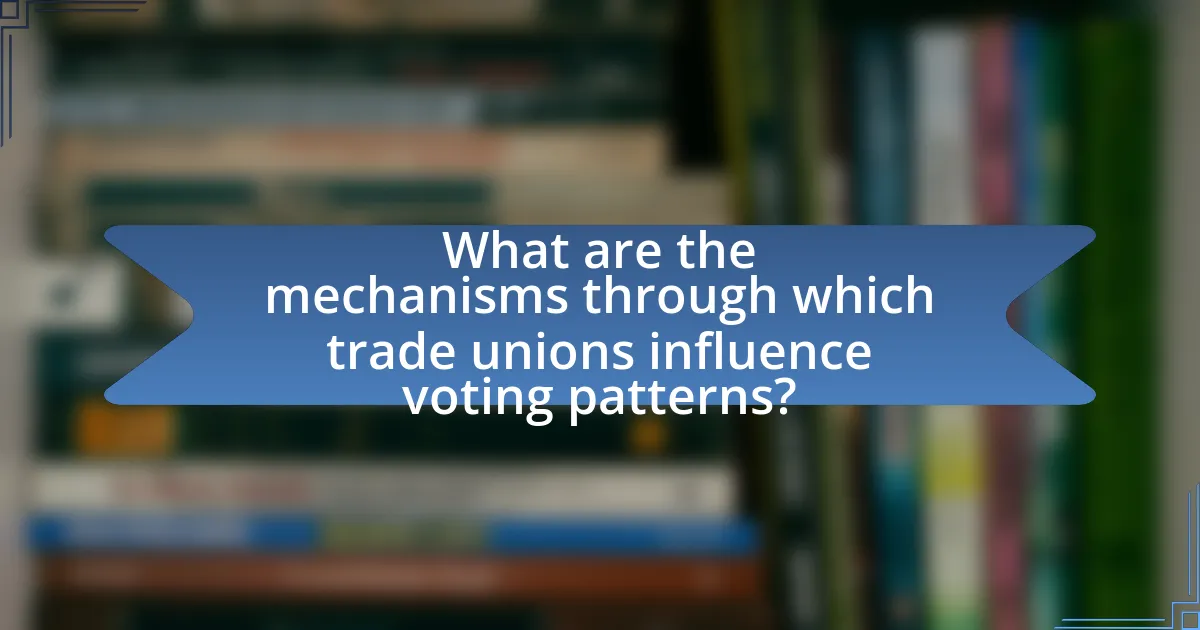
What are the mechanisms through which trade unions influence voting patterns?
Trade unions influence voting patterns primarily through mobilization, political education, and collective bargaining. Mobilization occurs when unions organize members to participate in elections, often providing resources such as transportation to polling places and coordinating group voting efforts. Political education involves informing members about candidates’ positions and policies that affect workers’ rights, thereby shaping their voting decisions. Collective bargaining allows unions to negotiate on behalf of workers, aligning their interests with specific political parties that support labor-friendly policies. For instance, in South Africa, the Congress of South African Trade Unions (COSATU) has historically endorsed the African National Congress (ANC), influencing its members to vote in favor of the party due to shared goals regarding labor rights and social justice.
How do trade unions engage with their members during elections?
Trade unions engage with their members during elections primarily through organized campaigns that include voter education, mobilization efforts, and communication of political positions. These unions conduct workshops and meetings to inform members about candidates’ policies and the implications for workers’ rights, thereby enhancing political awareness. For instance, the Congress of South African Trade Unions (COSATU) actively promotes voter registration drives and encourages participation in elections to ensure that workers’ interests are represented. This engagement is crucial as it not only influences voting patterns but also strengthens the political voice of the labor movement in South Africa.
What strategies do trade unions use to encourage voter turnout?
Trade unions employ several strategies to encourage voter turnout, including mobilization campaigns, education initiatives, and community engagement. Mobilization campaigns often involve organizing members to participate in voting drives, providing transportation to polling stations, and coordinating group voting efforts. Education initiatives focus on informing union members about the importance of voting, the electoral process, and the implications of various policies on workers’ rights. Community engagement involves collaborating with local organizations to create a broader coalition that emphasizes the significance of voting in achieving social and economic justice. These strategies are supported by research indicating that union members are more likely to vote when actively engaged through these methods, as evidenced by increased turnout rates in elections where unions have implemented such initiatives.
How do unions communicate political messages to their members?
Unions communicate political messages to their members primarily through newsletters, meetings, and digital platforms. These methods allow unions to disseminate information about political issues, mobilize members for campaigns, and encourage participation in elections. For instance, the Congress of South African Trade Unions (COSATU) regularly uses newsletters to inform members about political developments and advocate for specific policies, thereby influencing voting behavior. Additionally, unions often organize rallies and workshops to engage members directly, fostering a sense of solidarity and collective action around political causes.
What impact do trade unions have on party policies and platforms?
Trade unions significantly influence party policies and platforms by advocating for workers’ rights and social justice, which often leads political parties to align their agendas with these priorities. For instance, in South Africa, the Congress of South African Trade Unions (COSATU) has historically shaped the African National Congress (ANC) policies, pushing for labor-friendly legislation and social equity measures. This influence is evident in the ANC’s commitment to policies such as the National Minimum Wage Act, which was largely driven by union advocacy. Additionally, trade unions mobilize their members to vote, thereby impacting electoral outcomes and compelling parties to consider union demands in their platforms to secure support.
How do trade unions advocate for specific issues within political parties?
Trade unions advocate for specific issues within political parties by mobilizing their membership to influence party policies and electoral platforms. They engage in lobbying efforts, organize campaigns, and participate in party conferences to ensure that workers’ rights, labor laws, and social justice issues are prioritized. For instance, the Congress of South African Trade Unions (COSATU) has historically aligned with the African National Congress (ANC) to push for policies that benefit the working class, demonstrating their ability to shape political agendas through collective bargaining and strategic alliances. This advocacy is evidenced by COSATU’s role in the drafting of the ANC’s 1994 election manifesto, which included commitments to labor rights and economic equity.
What is the relationship between union demands and party responses?
Union demands significantly influence party responses in South Africa, as political parties often align their policies with the interests of powerful trade unions to secure electoral support. For instance, the African National Congress (ANC) has historically adjusted its labor policies in response to union pressures, particularly from the Congress of South African Trade Unions (COSATU), which is a key ally. This alignment is evident in the ANC’s promotion of labor-friendly legislation, such as the Labour Relations Act of 1995, which was influenced by union advocacy for workers’ rights. Consequently, the relationship is characterized by a reciprocal dynamic where unions mobilize their members to support parties that address their demands, while parties respond by adopting policies that resonate with union interests to maintain electoral viability.
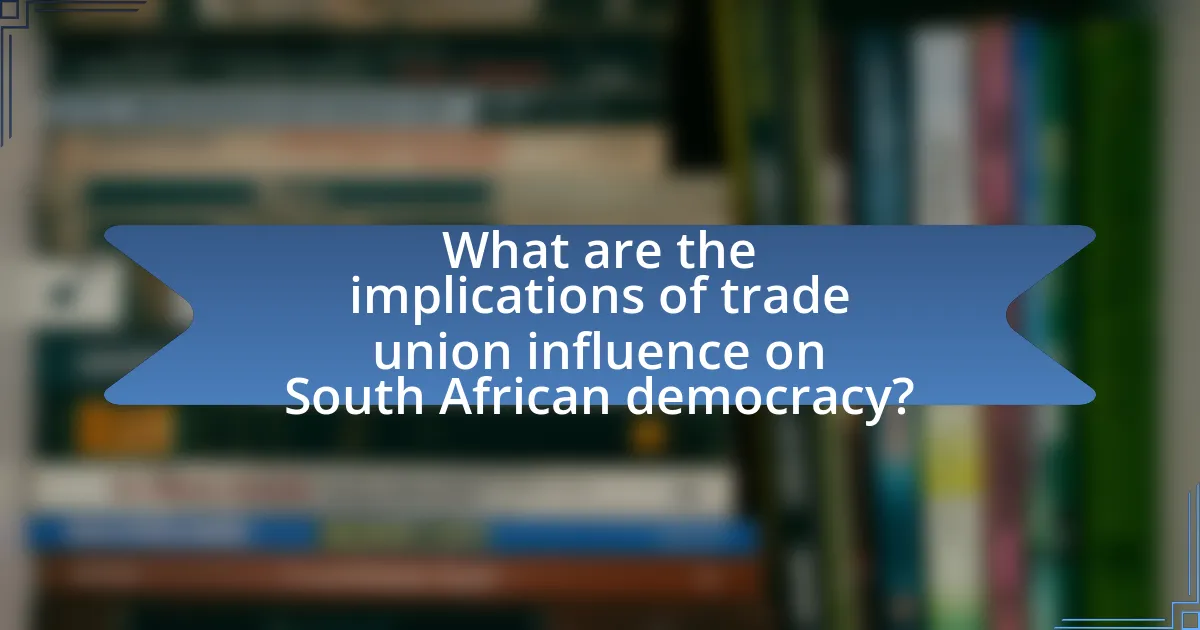
What are the implications of trade union influence on South African democracy?
Trade union influence significantly shapes South African democracy by mobilizing workers and impacting political agendas. Trade unions, such as the Congress of South African Trade Unions (COSATU), play a crucial role in advocating for labor rights and social justice, which directly influences policy-making and electoral outcomes. For instance, during the 2019 elections, trade unions actively campaigned for the African National Congress (ANC), reflecting their ability to sway voter preferences and align political platforms with workers’ interests. This influence can lead to enhanced representation of labor issues in government but may also result in political polarization, as unions may prioritize their agendas over broader democratic consensus.
How does trade union influence affect electoral outcomes?
Trade union influence significantly affects electoral outcomes by mobilizing voters and shaping political agendas. In South Africa, trade unions, particularly the Congress of South African Trade Unions (COSATU), have historically played a crucial role in organizing workers and advocating for policies that align with their interests. For instance, during the 2019 elections, COSATU endorsed the African National Congress (ANC), which helped the party secure a majority by rallying union members to vote. Research indicates that union members are more likely to participate in elections and support candidates who prioritize labor rights, demonstrating the direct correlation between trade union activity and electoral success.
What evidence exists to show trade union impact on election results?
Trade unions significantly impact election results in South Africa by mobilizing voters and influencing political agendas. For instance, the Congress of South African Trade Unions (COSATU) has historically endorsed the African National Congress (ANC), which has been linked to increased voter turnout for the party. Research conducted by the Electoral Institute for Sustainable Democracy in Africa (EISA) indicates that in the 2014 national elections, areas with high union membership saw voter turnout rates approximately 10% higher than those with lower union presence. Additionally, trade unions often engage in campaigns that educate members on political issues, further shaping electoral outcomes.
How do trade unions affect voter alignment with political parties?
Trade unions significantly influence voter alignment with political parties by mobilizing their members and advocating for specific political agendas. In South Africa, trade unions often align with political parties that support labor rights and social justice, such as the African National Congress (ANC). This alignment is evident in the 2019 elections, where the Congress of South African Trade Unions (COSATU) endorsed the ANC, encouraging its members to vote for the party, which resulted in a substantial voter turnout among union members. Research indicates that union members are more likely to vote for parties that prioritize workers’ interests, demonstrating the direct impact of trade unions on political preferences and electoral outcomes.
What challenges do trade unions face in influencing voting patterns?
Trade unions in South Africa face significant challenges in influencing voting patterns, primarily due to political fragmentation and declining membership. Political fragmentation arises from the diverse interests within the labor movement, which can lead to conflicting agendas and weaken a unified voting bloc. Additionally, declining membership numbers, which have fallen from 30% of the workforce in the 1990s to around 25% in recent years, limit the unions’ capacity to mobilize voters effectively. These factors hinder trade unions’ ability to exert influence in elections, as evidenced by the reduced impact of union endorsements on voter behavior in recent elections.
How do changing political dynamics affect union influence?
Changing political dynamics significantly affect union influence by altering the power balance between labor organizations and government entities. For instance, shifts in political leadership can lead to changes in labor laws, impacting union bargaining power and membership engagement. In South Africa, the transition from apartheid to a democratic government in the 1990s empowered trade unions, allowing them to play a crucial role in shaping labor policies and influencing voting patterns. Conversely, recent political shifts, such as the rise of populist movements, have sometimes marginalized union voices, reducing their influence in political discourse and decision-making processes. This dynamic illustrates how political contexts directly shape the operational landscape for unions, affecting their ability to advocate for workers’ rights and interests.
What are the potential risks of trade union political involvement?
The potential risks of trade union political involvement include the possibility of alienating non-union members and creating divisions within the workforce. When trade unions engage in political activities, they may prioritize specific political agendas that do not represent the interests of all workers, leading to dissatisfaction among those who feel excluded. Additionally, political involvement can divert resources and focus away from core labor issues, such as wage negotiations and workplace safety, potentially weakening the union’s primary mission. Historical examples, such as the decline in union membership in South Africa during politically charged periods, illustrate how political affiliations can impact union effectiveness and worker solidarity.
What best practices can trade unions adopt to enhance their influence?
Trade unions can enhance their influence by adopting strategic communication, building coalitions, and engaging in grassroots mobilization. Strategic communication involves clearly articulating their goals and values to members and the public, which can increase visibility and support. Building coalitions with other organizations, such as community groups and political parties, can amplify their voice and create a united front on key issues. Grassroots mobilization, including organizing rallies and encouraging member participation in political processes, can strengthen their impact on voting patterns. For instance, the Congress of South African Trade Unions (COSATU) has effectively used these practices to influence labor policies and electoral outcomes in South Africa, demonstrating the effectiveness of these strategies in enhancing union influence.
